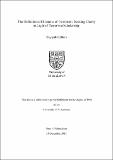Files in this item
The definitional dilemma of terrorism : seeking clarity in light of terrorism scholarship
Item metadata
| dc.contributor.advisor | English, Richard | |
| dc.contributor.author | Gillani, Dayyab | |
| dc.coverage.spatial | 275 p. | en_US |
| dc.date.accessioned | 2017-12-05T14:45:28Z | |
| dc.date.available | 2017-12-05T14:45:28Z | |
| dc.date.issued | 2017-06-20 | |
| dc.identifier.uri | https://hdl.handle.net/10023/12258 | |
| dc.description.abstract | The understanding of terrorism has thus far been determined not by some independent line of inquiry but instead by a strong interplay between conflicting moral positions. Treated sometimes as a method or tactic and at other times as a distinct form of violence, the true nature of terrorism remains elusive, while a failure to understand it has squarely been blamed on the moral problem. The conceptual and theoretical debate in the field of terrorism studies as a result has not progressed in any meaningful way. Issues that were associated with terrorism when a formal inquiry into the problem was first launched still remain unresolved. Basic questions as to whether terrorism generates fear and if it is possible to identify its victim or perpetrator continue to plague the terrorism discourse. Meanwhile matters that are crucial, such as the widespread tendency to treat terrorism as a tactic, strategy or ideology and the essentially contested character of terrorism scholarship are either ignored or erroneously taken for granted. This thesis will show that our inability to define terrorism is not due to the moral problem as it is made out to be but because of our failure to understand the true nature of terrorism. To accomplish this task, it not only analyzes issues that are regularly contested but also discusses in detail the ones that are trivialized and overlooked. It ultimately concludes that terrorism primarily plays only an auxiliary or a facilitatory role and therefore the key to defining it and understanding its true nature lies in its utility and function. | en_US |
| dc.language.iso | en | en_US |
| dc.publisher | University of St Andrews | |
| dc.rights | Attribution-NonCommercial-NoDerivatives 4.0 International | * |
| dc.rights.uri | http://creativecommons.org/licenses/by-nc-nd/4.0/ | * |
| dc.subject | Terrorism | en_US |
| dc.subject | Morality | en_US |
| dc.subject | Just war | en_US |
| dc.subject | Violence | en_US |
| dc.subject | Definition | en_US |
| dc.subject | War | en_US |
| dc.subject | Theatre | en_US |
| dc.subject | Non-combatants | en_US |
| dc.subject.lcc | HV6431.G5 | |
| dc.subject.lcsh | Terrorism--Moral and ethical aspects | en |
| dc.subject.lcsh | Terrorism--Research | en |
| dc.title | The definitional dilemma of terrorism : seeking clarity in light of terrorism scholarship | en_US |
| dc.type | Thesis | en_US |
| dc.type.qualificationlevel | Doctoral | en_US |
| dc.type.qualificationname | PhD Doctor of Philosophy | en_US |
| dc.publisher.institution | The University of St Andrews | en_US |
The following licence files are associated with this item:
This item appears in the following Collection(s)
Except where otherwise noted within the work, this item's licence for re-use is described as Attribution-NonCommercial-NoDerivatives 4.0 International
Items in the St Andrews Research Repository are protected by copyright, with all rights reserved, unless otherwise indicated.


